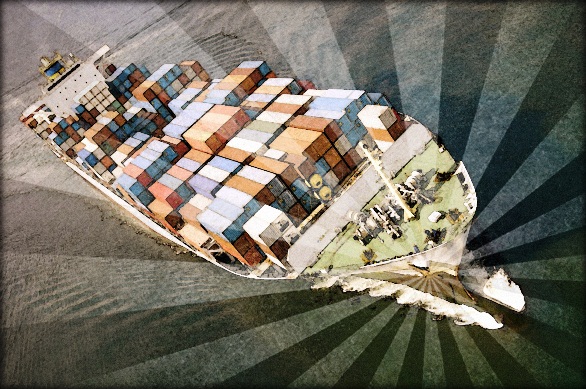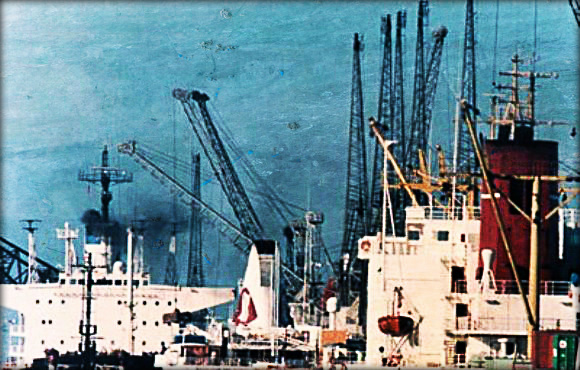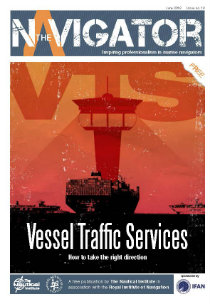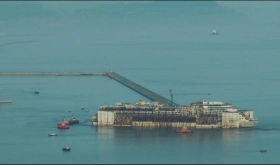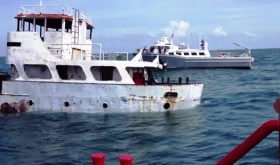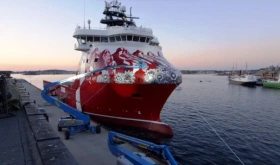Water ingress to the engine room of a bulk carrier was discovered during a voyage. The leakage was found to come through the short sounding pipe of the bilge water holding tank in the double bottom. After the visual inspection of the tank, the sea water ingress was found to come through an approximately 45 mm diameter area of serious pitting/hole in bottom plate (see figure below).
Paris MoU Detention Report for Bulk Carrier MV EEC Atlantic
M/V EEC Atlantic arrived at Hamburg on 27.11.2008 to discharge bulk cargo. On the same day a PSC-inspection has been carried out. The ship’s statutory certificates were expired since June 2011. The inspection revealed 43 deficiencies of which 9 were considered as ground for detention.
Drilling Rig Anchoring Failure Incident Information
A few months ago PSA issued a new journal providing valuable information on some of the most relevant issues and challenges that are being faced by the oil & gas industry in the field of safety. The following information is an extract from PSA’s journal “Dialogue” regarding a mooring incident on the drilling rig Ocean Vanguard in 2004.
Emissions Reduction for Ocean Container Transport
BSR’s Clean Cargo Working Group’s 2013 “Collaborative Progress” report-which provides data from more than 2,300 ships, representing more than 60 percent of global ocean container capacity-indicates that average carbon-dioxide emissions for global ocean container transport have declined year on year, and by more than 7 percent between 2011 and 2012.
Incident Information on Fuel Oil Spill Due to Oily Water Overboard Pipe Corrosion
The following incident took place onboard an oil tanker while the vessel was in port of discharge. Heated fuel oil was found to be seeping from the “oily water” overboard discharge pipe, and the vessel was subsequently detained. As soon as the oil spill was discovered the port heated fuel oil tank was emptied by transferring to another tank and the heated fuel oil tank/piping for the tank closed/sealed.
Recent Anti and Counter Piracy Developments in the Indian Ocean and the Gulf of Guinea
There is difference between anti-piracy and counter-piracy. Anti-piracy is about elimination; medium to long-term perspective, strategic, national, regional and international character, in other words it is a ”pipe dream”, cannot be done. Counter- piracy is about containment; short term and medium term, tactical, operational, private, national, regional and international character. This presentation/article is about counter-piracy policies and initiatives. When it comes to East Africa, believe it or not, 99.5% of the funds spent on counter-piracy go to counter-piracy operations.
GHG Emissions from Ships and The MRV Proposal
Shipping is the only sector without an EU cap on emissions. In 2009, the EU committed to include shipping in its climate policy but instead the Commission proposed last year only to monitor CO2 emissions. While the Monitoring, Reporting and Verification (MRV) proposal is a step in the right direction, it lacks ambition and will have little impact if left unchanged. It can be strengthened to create a MRV system that may not only be used for CO2, but also for SOx and NOx – harmful air pollutants. To actually reduce emissions, unreliable monitoring methods should be removed, and data transparency should be ensured. Finally, there should be a path for transition of MRV requirements into real emissions-reduction measures.
Incident information on Accident Caused by Fractured Exhaust Gas Boiler Circulating Pump
This incident occurred while at sea when crewmembers were switching from one circulating pump of the exhaust gas boiler to the other, as part of normal operation. The connected pump fractured and released considerable amount of hot water and steam.
KPI Best practices from a Ship Manager’s Perspective
There are many different definitions for a Ship Manager so it might be interesting to look at what a Ship Manager really is and it does not matter if the Ship Manager is an in-house manager or a third-party manager, but the integrated components of ship management are what really matters. Management translates market rate and days into profit and good management maximizes those profits or to put it simply, good Ship management transfers charters into dollars.
How Oily Waste is Generated Onboard Vessels
This post is an extract from EMSA’s publication “Addressing Illegal Discharges in the Marine Environment” focusing on the various ways oily waste are being produced onboard vessels. The volume of oily waste generated and/or stored on board a vessel depends on various factors. These include, for example type, age and size of vessel; type and age of equipment related to oil separation and storage; maintenance of vessel and equipment and external factors such as availability of Port Reception Facilities.



